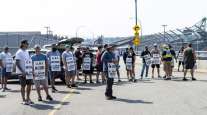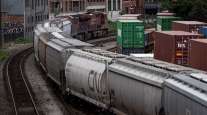NLRB Action Claims Intermodal Bridge Transport Misclassified Drivers

The case, which arose from incidents last year, is an escalation of a union complaint about misclassification and represents the “first test of whether misclassification in and of itself violates the National Labor Relations Act,” Julie Dickinson Gutman, an attorney at union law firm Bush Gottlieb in Los Angeles, told TT.
The NLRB action coincided with a one-day strike by drivers on April 20 against the trucking company, an affiliate of COSCO Logistics (Americas). The NLRB case is the latest in a series of labor actions by port drivers in the region, who with Teamsters backing also have fought driver classification battles in state-level actions before labor regulators, and in class-action suits.
Gary Schubert, executive vice president of the drayage company that has six other operating locations, including some in the New York and Chicago areas, declined to comment when reached by TT. COSCO (China Ocean Shipping Co.), is a government-owned ocean carrier that is combining with another ocean shipping carrier, China Shipping Container Line, to become the fourth-largest ocean carrier in the world.
Intermodal Bridge’s actions have been “interfering with, restraining and coercing employees in the exercise of the rights guaranteed” to form a union, states the complaint signed by NLRB Regional Director Olivia Garcia, which sets a June 13 hearing for the case.
“The case is significant for a number of reasons,” said Steve Swirsky, an attorney at Epstein Becker Green, a New York law firm that represents companies in employment cases.
“While it is quite unusual, it is likely to be a harbinger of the NLRB taking similar action in other cases,” such as those involving Uber drivers, he told TT. “What the board is saying here is that it agrees with the Teamsters. By arguing that it is an unfair labor practice to misclassify a driver in these circumstances, the board is forcing the terminal operators and other logistics firms to act at their peril.”
The complaint specifically cites five employees and four types of activities as violations of U.S. labor law.
One allegation cites questions by a dispatcher to a driver about his support for the union. Another was promising the driver more work if the driver refrained from engaging in union organizing, and another was threatening to close the carrier’s Los Angeles operation if the union won a representation. In addition, the complaint says a dispatcher “threatened an employee with unspecified reprisals by stating that there would be consequences and employees would regret it if employees continued supporting the union.”
“We can also expect that they will also push this strategy in concert with claims that companies like the alleged employer in this case are actually joint employers with the port and terminal operators that retain them to assist with moving cargo, in an effort to find the deepest pockets,” Swirsky said.
Curtis Whalen, executive director of the Intermodal Motor Carriers Conference of American Trucking Associations, said the move appears to be part of a “continuing case of leaving no stone unturned” in an effort to change driver classifications. A key issue, he said, is whether the NLRB ruling, if it favors the drivers, has a broad application, or is specific to this case.
He also observed that this appears to be a case of the Obama administration moving on multiple fronts to advance its labor agenda.




